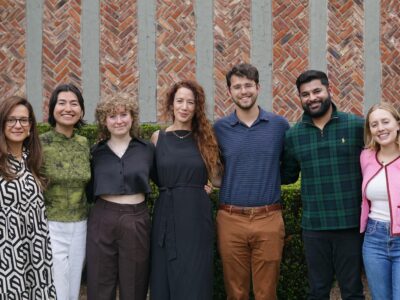The Climate Group has selected the Columbia Climate School as its university partner for this year’s Climate Week NYC. Running from Sept.19-25, Climate Week NYC convenes key climate leaders to accelerate climate action and is the biggest global climate event of its kind.
“The Columbia Climate School is proud to partner with Climate Week NYC on this agenda-setting event series at a moment of intensifying urgency in the fight against climate change,” said Climate School Founding Dean Alex Halliday. “The kind of collaboration and collective action advanced by Climate Week NYC aligns with our school’s values and our efforts to turn knowledge into action to respond to the greatest challenge facing our planet.”
Now in its 14th year, Climate Week NYC is a key time of year for businesses, governments, civil society, and the wider global audience to gather to showcase leading climate solutions and discuss how to do more, fast. It has been instrumental in creating global momentum toward climate action.
Several Climate Week NYC 2022 in-person events will feature Columbia Climate School experts and be hosted on Columbia’s campuses in Morningside Heights and in Manhattanville. Information about speakers, delegates, and the events program can be found on the new Climate Week NYC website.
“We are excited to again partner with Columbia Climate School for this year’s Climate Week NYC,” said Helen Clarkson, CEO of Climate Group. “Universities play a key role in educating the public, providing a clear analysis of science-based progress and targets, and creating the next generation of leaders who can ensure that climate action is weaved into all sectors, so we can build a better future for all.”
Established in 2020, the Columbia Climate School represents an historic commitment by Columbia to tackle the climate crisis. The first new school to be established at Columbia in 25 years, it serves as a hub for research, learning, and action. The Climate School builds on Columbia’s strengths to solve problems, educate future climate leaders, and generate the knowledge needed to design and inspire solutions as the window to avert the potentially catastrophic effects of climate change closes. The school’s second class of incoming students arrives on campus this month.
Last year, Climate Week NYC was home to more than 500 events held virtually from 30-plus countries around the world. This year, the week will continue to build on that momentum with in-person events covering 10 themes: built environment, energy, environmental justice, transport, finance, sustainable living, nature, policy, industry and food.
“This is the critical decade to achieve deep reductions in carbon pollution and avert the most catastrophic impacts of climate change,” said Daniel Zarrilli, special advisor on climate and sustainability at Columbia University. “By naming the Columbia Climate School as the university partner to Climate Week NYC 2022, the Climate Group is affirming the vital role of universities like Columbia in empowering the next generation of leaders and delivering solutions now that will help us to end our addiction to fossil fuels. We look forward to partnering on another successful Climate Week as we all work to achieve the goals of the Paris Agreement and secure a livable earth for the next generation.”
Leading the Columbia Climate School are four of the university’s top climate experts: Alex Halliday, who is also director of Columbia’s Earth Institute; Jason Bordoff, founding director of Columbia’s Center on Global Energy Policy; University Professor Ruth DeFries; and Maureen Raymo, director of Columbia’s Lamont-Doherty Earth Observatory.





Great that the university is using its resources to educate and explore creative solutions to climate change. The efforts would be more convincing if they made more of an effort internally to encourage environmentally responsible research practices and recycling. Asking others to change their behaviour is more convincing when you model the changes needed!
I hope that they’ll make some progress